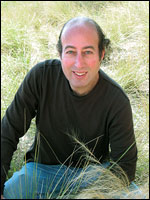Dr. Kenneth S. Kosik
The PhysOrg article Scientists discover how the brain encodes memories at a cellular level said
“Scientists at UC Santa Barbara have made a major discovery in how the brain encodes memories. The finding, published in the December 24 issue of the journal Neuron, could eventually lead to the development of new drugs to aid memory.The team of scientists is the first to uncover a central process in encoding memories that occurs at the level of the synapse, where neurons connect with each other.
‘When we learn new things, when we store memories, there are a number of things that have to happen,’ said senior author Kenneth S. Kosik, co-director and Harriman Chair in Neuroscience Research, at UCSB’s Neuroscience Research Institute. Kosik is a leading researcher in the area of Alzheimer’s disease.
‘One of the most important processes is that the synapses — which cement those memories into place — have to be strengthened,’ said Kosik. ‘In strengthening a synapse you build a connection, and certain synapses are encoding a memory. Those synapses have to be strengthened so that memory is in place and stays there. Strengthening synapses is a very important part of learning. What we have found appears to be one part of how that happens.’”
Kenneth S. Kosik, M.D. is Harriman Professor of Neuroscience Research, MCDB and Co-Director, Neuroscience Research Institute. He is also Executive Director of Cognitive Fitness and Innovative Therapies.
Ken earned his M.D. degree in 1976 from the Medical College of Pennsylvania and completed a neurology residency from Tufts New England Medical Center where he served as chief resident in 1979. From 1980 until 2005 he held various appointments at the Harvard Medical School where he became Professor of Neurology and Neuroscience in 1996. In the fall of 2004 he assumed the co-directorship of the Neuroscience Research Institute and the Harriman Chair in the Department of Molecular, Cellular and Developmental Biology at the University of California Santa Barbara.
He received a Whitaker Health Sciences Award from Massachusetts Institute of Technology, a Metropolitan Life Foundation Medical Award, the Derek Denny-Brown Neurological Scholar Award from the American Neurological Association, the Zenith Award from the Alzheimer’s Association, the Ranwell Caputo Medal from the Argentine Society of Neurochemistry, and a NASA Group Achievement Award to the Neurolab Science Team.
Ken authored Alzheimer’s Disease: Lessons from Cell Biology, and coauthored The Alzheimer’s Solution: How Today’s Care Is Failing Millions – and How We Can Do Better and When Someone You Love Has Alzheimer’s: The Caregiver’s Journey.
Ken’s papers include MicroRNA-21 Is an Antiapoptotic Factor in Human Glioblastoma Cells, A microRNA array reveals extensive regulation of microRNAs during brain development, Identification of many microRNAs that copurify with polyribosomes in mammalian neurons, Translocation of RNA Granules in Living Neurons, Sorting of β-Actin mRNA and Protein to Neurites and Growth Cones in Culture, RNAi functions in cultured mammalian neurons, CHIP-Hsc70 Complex Ubiquitinates Phosphorylated Tau and Enhances Cell Survival, and Parkin Localizes to the Lewy Bodies of Parkinson Disease and Dementia with Lewy Bodies. Read his full list of publications!
Watch Technology Management Program UCSB Stem Cell. Read Scientists shed light on inner workings of human embryonic stem cells, MicroRNAs Provide New Insight in Study of Autism, Origins of nervous system found in genes of sea sponge, and Scientists make headway in understanding Alzheimer’s disease. Read his LinkedIn profile.
